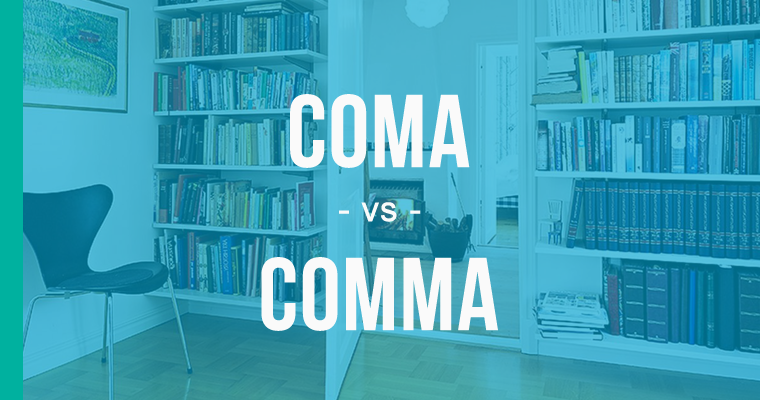Coma vs. Comma – How To Use Each Correctly

What’s the Difference Between Coma and Comma?
Contents
Coma and comma look and sound fairly similar, but not exactly alike. Coma has a long o sound whereas comma has a short o sound. The two words’ definitions, however, are nothing alike.
Coma is a noun that means an extended period of unconsciousness.
- After a terrible car accident, the man entered a coma for three years.
Comma is also a noun. It refers to a type of punctuation.
- Commas are necessary to separate items in a list of three or more.
Now, let’s go over a few ways you can use these words in your sentences.
Using Coma in a Sentence
When to use coma: Coma is a noun that refers to a prolonged state of unconsciousness.
For example,
- Injuries to the head can cause comas, as can poisoning.
- Many comas are temporary, whereas some people never wake up from their comas.
There are a few common expressions and collocations with coma:
- in a coma: to be in a state of prolonged unconsciousness
- Some people who were in a coma woke up and reported that they could hear and understand what people said to them while in that state.
- to fall/lapse into a coma: to enter the state of being in a coma
- She fell into a coma during her illness.
- to induce a coma: to medically put someone in a coma for their own safety
- The doctors induced a coma in order to give him the best chance of survival.
Coma comes from Greek origins and is related to the word comatose.
Using Comma in a Sentence
When to use comma: Comma is a noun that is the name of a certain punctuation mark. This type of punctuation designates in written texts where a slight pause would go in spoken English.
For example,
- It is necessary to use a comma when a dependent clause precedes an independent clause.
- Commas are important because they make written sentences easier to read.
Other types of punctuation include the period, question mark, colon, semicolon, and exclamation mark. The word comma also comes from the Greek language originally, and meant clause within a sentence.
Remembering Coma vs. Comma
It is possible to use the spelling of coma and comma to distinguish the two words from one another.
Coma is a medical condition that ends with the letters oma. Many other medical terms end with oma as well, including hematoma, glaucoma, sarcoma, and carcinoma.
Comma is a type of punctuation, and therefore related to grammar. Grammar and comma both contain the letter sequence mma.
Outside Examples
- Hitching his wagon to a junkie would not turn out to be the greatest life choice. While his crew enjoyed some commercial success, Flash smoked his way into oblivion, finally winding up hospitalized in a coma for two days in 1984. –New York Post
- Doctors at a hospital in Innsbruck will start waking up an Ajax midfielder who has been kept in an induced coma since collapsing during a friendly game in the Austrian Alps on Saturday. –USA Today
- But you’d be hard pressed to find a punctuation book that tells you how to make a possessive out of something that you’ve already decided must be followed by a comma. –LA Times
- Maine law says overtime doesn’t apply to certain duties and lists them, including “packing for shipment or distribution of” foods. There’s no Oxford, or serial, comma in the phrase so the drivers said it refers to packing only, which they don’t do. –New York Daily News
Quiz: Comma vs. Coma
Instructions: Fill in the blank with the correct word, either comma or coma in the correct form.
- ________________ are even more common than periods.
- Medically induced ____________ can help reduce pressure on the brain.
- She had a bad stroke which temporarily caused her to lapse into a ___________.
- The English students are struggling with the rules for using _____________. They are constantly adding one where it doesn’t belong and omitting one where it is necessary.
- Sleeping Beauty is a famous fairy tale character who was in a magically induced __________.
See answers below.
Article Summary
Should I use coma or comma? These words sound similar, but they have no overlap in meaning.
- Coma is a medical issue that relates to being unconscious for an extended period of time.
- Comma is related to grammar and is a type of punctuation mark.
Make sure to never interchange these two words. Use coma only for an unconscious person and comma only for punctuation.
Answers from Quiz
- Commas
- comas
- coma
- commas
- coma
